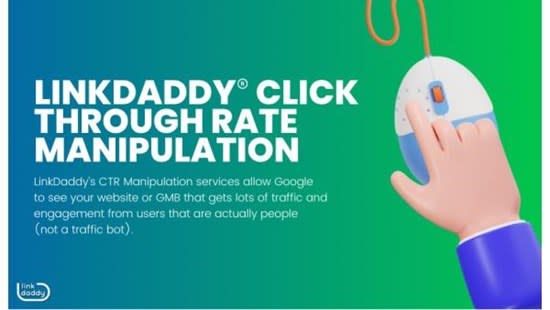Discover the Power of CTR Manipulation in Press Releases
Discover the Power of CTR Manipulation in Press Releases
Blog Article
Exploring the Intricacies of CTR Control: Approaches to Boost Organic Search Performance
In the realm of digital marketing, the realm of Click-Through Price (CTR) manipulation stands as an advanced yet pivotal approach that can substantially impact the natural search efficiency of a web site. As online search engine come to be extra in harmony with individual behavior and intent, understanding the art of enhancing CTR becomes a critical skill for marketing professionals and site owners alike. The intricacies of CTR control provide a landscape filled up with nuanced methods and subtle modifications that can move a web site's exposure and significance in internet search engine results. By studying the approaches and methods behind CTR optimization, a course towards unlocking higher natural search efficiency begins to unravel, promising insights that can improve electronic marketing efforts - GMB CTR manipulation.
Comprehending CTR and Its Significance

A high CTR shows that your web content is appropriate and engaging to customers, which can lead to increased traffic and higher rankings on online search engine. On the other hand, a reduced CTR might signal that your material is not reverberating with your target audience, potentially resulting in reduced presence and minimized natural traffic.
Studying User Behavior for CTR Optimization
To improve the efficiency of CTR optimization strategies, a comprehensive evaluation of user actions is necessary. By diving right into just how customers communicate with internet search engine results web pages (SERPs), marketing professionals can gain important understandings to customize their methods for enhanced click-through prices (CTR) and organic search performance. One vital facet to take a look at is the relevance of meta titles and descriptions to the customer's search intent. Understanding which keywords and expressions reverberate with the target audience can help in crafting compelling and helpful bits that entice customers to click on the link.
In addition, analyzing individual actions metrics such as bounce price, dwell time, and web pages per session can give a deeper understanding of how engaging and appropriate the material is to visitors. By recognizing patterns in user behavior, marketers can refine their material technique to much better line up with customer expectations, therefore enhancing the possibility of attracting clicks and driving natural web traffic. Basically, a data-driven technique to analyzing individual habits contributes in enhancing CTR and enhancing total search performance.
Crafting Compelling Meta Summaries
With a keen concentrate on customer involvement and search intent placement, crafting compelling meta descriptions plays an essential role in optimizing click-through prices (CTR) and improving organic search performance. Meta summaries are brief fragments that sum up a page's web content and are presented below the title tag on online search engine results web pages (SERPs) A well-crafted meta summary not just lures customers to click through to the website however also gives a clear preview of what they can expect, enhancing the possibility of drawing in relevant traffic.
To develop effective meta summaries, it is vital to maintain them concise, typically under 160 characters, and consist of pertinent keywords to signify to search engines and customers the material's importance to their inquiry. Furthermore, integrating a call-to-action can trigger customers to take the wanted activity, whether it is clicking with to the web site, enrolling in an e-newsletter, or purchasing. By crafting engaging meta descriptions that line up with user intent and showcase the value recommendation of the website here webpage, organizations can boost their CTR and drive more natural website traffic to their site.
Leveraging Rich Fragments for Greater CTR
Using rich snippets strategically can considerably enhance click-through prices (CTR) in natural search outcomes by supplying users with improved previews of website material. Rich fragments are additional pieces of details that go along with search engine result, offering individuals a look of what they can anticipate to locate on a specific web page. By integrating structured data markup, web site owners can maximize their material to appear even more prominently in internet search engine results web pages (SERPs) with rich snippets, such as celebrity ratings, product prices, event information, and a lot more.

Carrying Out Schema Markup for CTR Boost
By enhancing your website with schema markup, you can even more optimize the display of abundant snippets and elevate your click-through prices (CTR) in natural search outcomes. Schema markup provides online search engine with detailed information about the material on your website, helping them comprehend its context and importance. By executing schema markup strategically, you can improve the look of your search listings with added details like ratings, reviews, prices, and more. This added context not just makes your results a lot more aesthetically attractive however also increases the chance of catching individuals' attention and driving them to click with to your website.
Additionally, schema markup can additionally enhance your website's exposure in investigate this site internet search engine result pages (SERPs) by making it possible for online search engine to far better interpret and offer your web content. This can cause higher positions and increased organic web traffic, as internet search engine reward sites that give clear and structured information with improved visibility. For that reason, integrating schema markup into your search engine optimization approach can be a powerful tool for increasing your CTR and total natural search efficiency.
Conclusion
In conclusion, recognizing the intricacies of CTR adjustment try this is important for improving natural search performance. Assessing user actions, crafting compelling meta summaries, leveraging rich bits, and carrying out schema markup are effective approaches to enhance CTR.

By diving right into exactly how customers interact with search engine results pages (SERPs), marketers can get important understandings to customize their techniques for improved click-through rates (CTR) and natural search efficiency.With an eager focus on customer engagement and search intent alignment, crafting engaging meta descriptions plays a pivotal duty in optimizing click-through prices (CTR) and enhancing organic search performance.Using abundant snippets tactically can significantly enhance click-through prices (CTR) in organic search outcomes by providing individuals with improved sneak peeks of webpage content.Moreover, schema markup can additionally enhance your website's presence in search engine result pages (SERPs) by enabling search engines to much better translate and provide your material.
Report this page